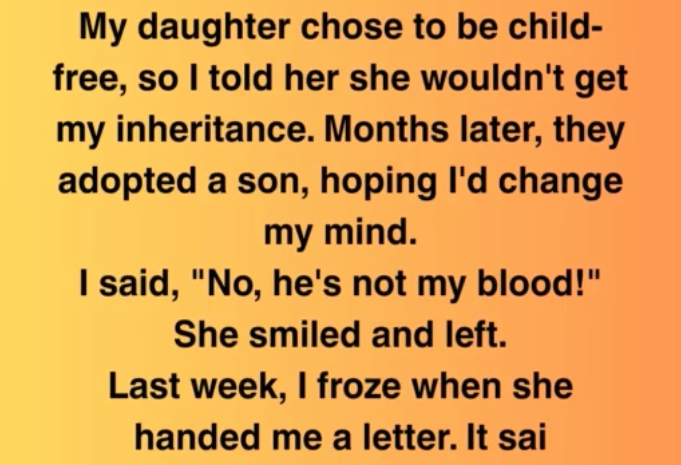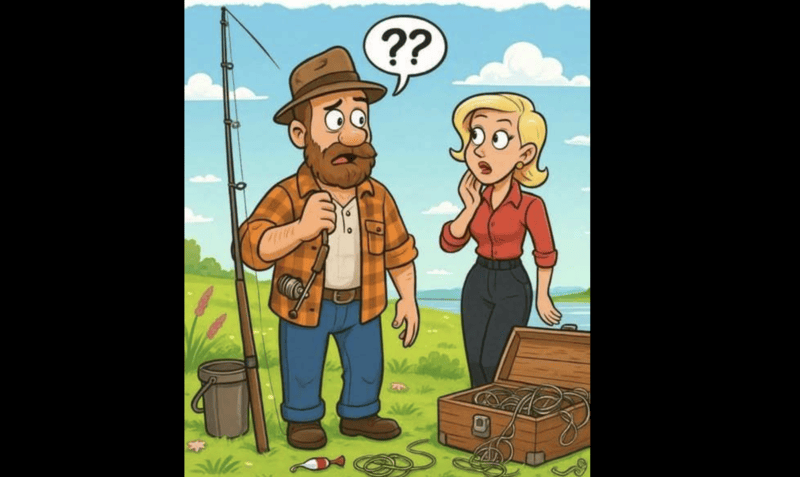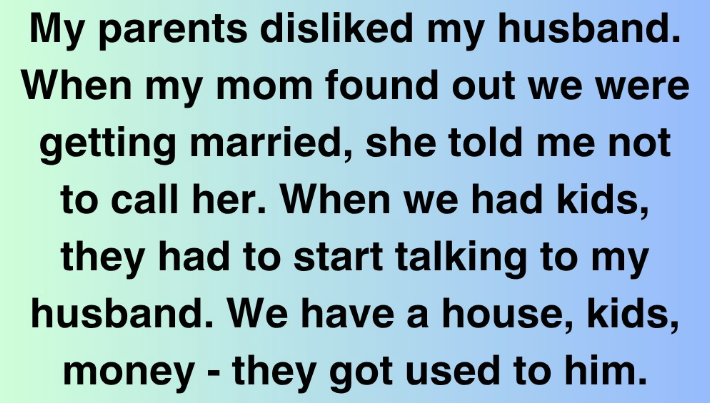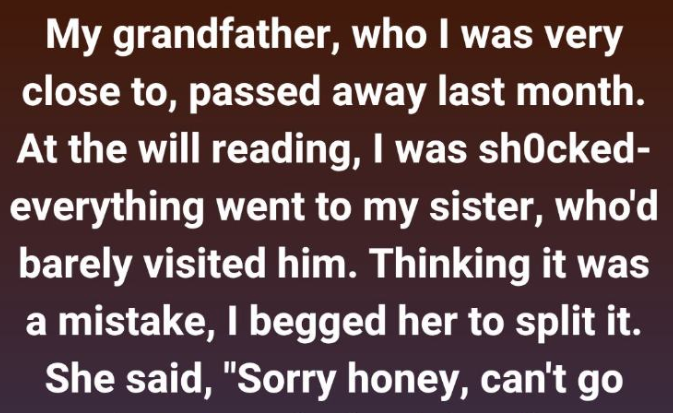I’m Delia, 67, a retired nurse from Florida. My life has been shaped by hard work—long shifts, scraped-together savings, a modest lake house, and a Honda that runs on grit and grace. I was raised on values of family, loyalty, and bloodlines, beliefs that rooted deep in my bones.
My daughter, Sana, always marched to her own rhythm. Quiet, bookish, she built robots in the garage while others dreamed of weddings and babies. I worried about her, though I kept it quiet. When she married Hector, a kind-hearted IT specialist from Chile, I exhaled. He was her anchor. But years rolled by—five, then seven—and no children came.
One Thanksgiving, I asked, “Are you two thinking of starting a family?”
Sana, wiping her hands on a dishtowel, answered plainly, “We don’t want kids, Mom.”
The words landed heavy. “Not ever?” I pressed.
“No,” she said, her tone even. “It’s not our path.”
I stayed calm—no theatrics for me—but I said, “Then don’t expect my inheritance. I worked too hard for it to go to a couple ending our family line.”
She didn’t flinch. Just carved the turkey, steady as stone.
After that, our bond frayed. Holidays passed with polite cards and stilted thank-yous, like a meal without flavor. We drifted.
Then, last year, a photo arrived. A boy with big dark eyes and curly hair, clutching a toy dump truck. His name: Mateo.
I called Sana. “What’s this?”
“We adopted,” she said, calm as always. “He’s six, from foster care.”
I laughed, sharp and bitter. “So you think this gets you back in the will?”
“No,” she said. “This isn’t about you.”
Then she added, “Maybe one day you’ll see that.”
Her words stung. I doubled down. “He’s not my blood. Don’t expect me to play grandma.”
“I don’t,” she said, and hung up.
Nearly a year passed. No more photos came. I told myself I was fine, but at night, I wondered about Mateo—his smile, his favorite snacks, whether he ever asked about me.
Then, last week, Sana appeared on my porch, holding a small envelope. No smile, no warmth.
“I’m not staying,” she said. “Read this.”
Before I could offer coffee, she handed me the letter and left.
It was from Mateo, written in wobbly pencil. “Hi Delia, I’m Mateo. I know you don’t want to see me. That’s okay. Mom says grownups can be sad in ways that make them say hard things. I think you might be sad too.”
My eyes blurred. I kept reading.
“I got a gold star for helping a scared kid at school. I planted a bean, and it grew. Mom says I might be a gardener like you. I hope you’re okay. From, Mateo.”
At the bottom, a drawing: a lopsided sun and a boy with curls holding a flower pot.
I sat, staring at my hands, for hours.
I’m not proud of my choices. I wasn’t cruel by design, but I was shaped by old beliefs—family is blood, inheritance stays with kin, strangers don’t belong. Those ideas hardened in me, like clay baked too long.
That night, I sat outside with wine and sobbed. Not quiet tears, but raw, messy ones. Mateo had done what I couldn’t—he reached out, despite my walls.
The next day, I drove to their house, unannounced. The street was calm, with kids’ bikes scattered about. My pulse raced.
Sana opened the door. For the first time in years, her eyes held a flicker of softness.
“I read the letter,” I said.
She nodded.
“Can I meet him?” I asked.
She didn’t answer, but stepped aside.
Mateo sat cross-legged, sketching. He looked up and grinned, so open it nearly broke me.
“You’re Delia!” he said.
“I am,” I said, voice catching. “And… you can call me Grandma, if you’d like.”
He nodded, like it was the simplest thing, and showed me his drawing. “It’s a flower for you.”
We spent the afternoon in their garden. Mateo knew more about beans than I’d guessed. He asked endless questions—why worms help plants, how deep to plant tomatoes, if sunflowers like songs. I could hardly keep up.
Every Sunday after, I showed up. We baked, planted herbs, took walks. He started calling me “Abuela Delia.” The first time, my heart swelled.
Sana watched closely at first, cautious. I didn’t blame her. But I kept coming, no strings attached, no coldness left.
One day, painting rocks for the garden, Mateo held up a blue oval one. “This is for when you die.”
I nearly dropped my brush. “What?”
He shrugged. “School said people die, but we can make memory rocks. I want you to have one now.”
I laughed, eyes wet. “That’s the sweetest thing anyone’s said about my death.”
He grinned, knowing it was odd and perfect.
A year passed like that. I became a grandma—truly. Mateo’s school photos lined my fridge. I called myself “his person” at the pharmacy, picking up his cough syrup, unbothered by curious glances.
Then, one day, Sana asked to talk privately. We sat on their porch while Mateo napped.
“You’ve changed,” she said softly.
“I was wrong,” I admitted. “Completely.”
“I know,” she said.
She pulled out a folder. “I never cared about your money. But there’s something you should know. Mateo is your blood.”
I froze. “What?”
“He’s Marisol’s son,” she said. “Dad’s second cousin. She died in a car crash three years ago. Mateo went into foster care.”
My mind reeled. I vaguely recalled Marisol—a photo from a Christmas long ago. She’d been so young.
“We didn’t seek him out,” Sana said. “But when the agency showed us his file, Hector recognized the name. We confirmed it.”
“I didn’t know—” I started.
“I know,” she said. “We didn’t tell you because it wasn’t about blood. But now, since you’ve built something real with him, I thought you deserved the truth.”
I sat, silent. Not just because Mateo was family by blood, but because I realized it didn’t matter. I’d loved him before I knew.
After that, I updated my will. The house will go to Sana and Hector. The savings are for Mateo’s college and future. Not out of guilt, but because it feels right.
The real treasure isn’t what I leave behind. It’s what I nearly lost.
Legacy isn’t a name etched in stone or money in a bank. It’s a boy’s crooked drawing of a sunglass-wearing sun. It’s a child calling you “Abuela” when you haven’t earned it. It’s planting a bean and watching it grow, not for DNA, but for love.
We get caught up in what family should be, missing the one we could build.
Here’s what I’ve learned: Blood is real, but love is a decision. And if you’re blessed, love will decide to find you.
If this story touched you, share it with someone who needs to hear that family is what you choose to make it. ❤️




